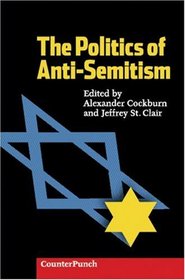Search -
The Politics of Anti-Semitism
The Politics of AntiSemitism
Author:
"Anti-Semite!" How did a term, once used accurately to describe the most virulent evil, become a charge flung at the mildest critic of Israel, particularly concerning its atrocious treatment of Palestinians? One answer is that there's no more explosive topic in American public life today than the issue of Israel, its oppression of ... more »
Author:
"Anti-Semite!" How did a term, once used accurately to describe the most virulent evil, become a charge flung at the mildest critic of Israel, particularly concerning its atrocious treatment of Palestinians? One answer is that there's no more explosive topic in American public life today than the issue of Israel, its oppression of ... more »
ISBN-13: 9781902593777
ISBN-10: 1902593774
Publication Date: 10/2003
Pages: 192
Rating: 2
ISBN-10: 1902593774
Publication Date: 10/2003
Pages: 192
Rating: 2
3 stars, based on 2 ratings
Genres:
- History >> Americas >> United States >> 20th Century >> General
- History >> Jewish >> General
- History >> Middle East >> Israel & Palestine





